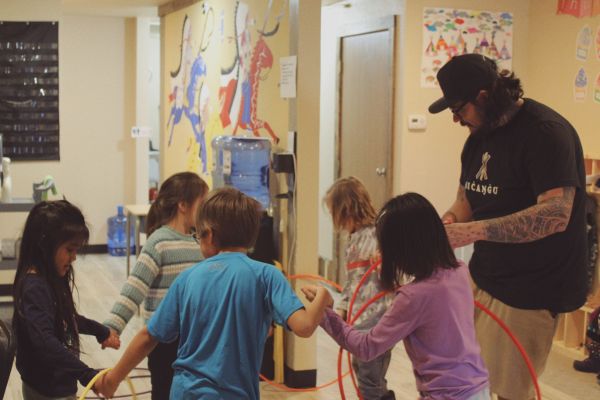
- Details
- By Kaili Berg
Now in its fourth year, the school is making strides with students to develop lifelong language learners who will preserve both the Lakota language and culture.
“The families and children who understand it are intellectual human beings and have the capacity to be economically independent,” Sage Fast Dog, the school’s founder and director, told Native News Online. “Over the last 150 years, schools have not been successful with Native Americans doing that. That’s why this school needed to be put in place. We have to take back our education.”
The program has more than 30 kindergarten through third-grade students taught primarily in Lakota in language.
The goals of the Wakanyeja Tokeyahci Wounspe Ti program include developing fluent Lakota language speakers; supporting students in learning about Lakota culture, traditions, and ways of being; honoring ancestors and elders; and developing the whole child.
“We want to make sure our kids are always secure wherever they go,” Fast Dog said. “Doing that is largely about holistic wellness, eating healthy, socializing with each other, and being who they are no matter where they go in this world where there are very few speakers.”
Teachers in the immersion program learn alongside the students with fluent speakers as mentors and monitors in the classrooms.
“Pairing a fluent speaker with a new teacher is the whole idea of moving everyone along at the same time,” Leland Little Dog, a fluent language speaking at the school, told Native News Online. “The advantage is they get to learn what I know because I am not trained in the classroom like them.”
Carm Shouldis, a teacher at the school, works alongside Little Dog in the immersion classes. Before, she did not see herself as someone who knew enough of the language to become a teacher. She trusted the process and developed a passion for teaching and language through her work in the program.
“I knew I was passionate about Indigenous education for children as a Lakota Teacher,” Shouldis said. “It means a lot to our children and they need to see themselves and their teachers succeed.”
Not only are students getting to learn their language, but they are fully immersed in Lakota culture as they share space learning songs, dance, and culturally significant stories and teachings.
“That’s why this school is important,” Fast Dog said. “We are thinking long term, we want our kids to be there, and we want our families to know that we value where we want to be. It’s going to take some time to get there.”
More Stories Like This
Ramos Pushes Legislation for Compassion for Students with Drug Infractions Versus Punitive DisciplineDePaul University Designated AANAPISI Institution by US Department of Education
Chumash Foundation’s Technology in Schools Program Grant Application Deadline is April 30
Expanded Staff, New Space Helps Connect Labriola Center with Native American Community
American Indian College Fund Sets Higher Education Listening Sessions for April 16 & 22
Native Perspective. Native Voices. Native News.
We launched Native News Online because the mainstream media often overlooks news that is important is Native people. We believe that everyone in Indian Country deserves equal access to news and commentary pertaining to them, their relatives and their communities. That's why the story you’ve just finished was free — and we want to keep it that way, for all readers. We hope you'll consider making a donation to support our efforts so that we can continue publishing more stories that make a difference to Native people, whether they live on or off the reservation. Your donation will help us keep producing quality journalism and elevating Indigenous voices. Any contribution of any amount — big or small — gives us a better, stronger future and allows us to remain a force for change. Donate to Native News Online today and support independent Indigenous-centered journalism. Thank you.

